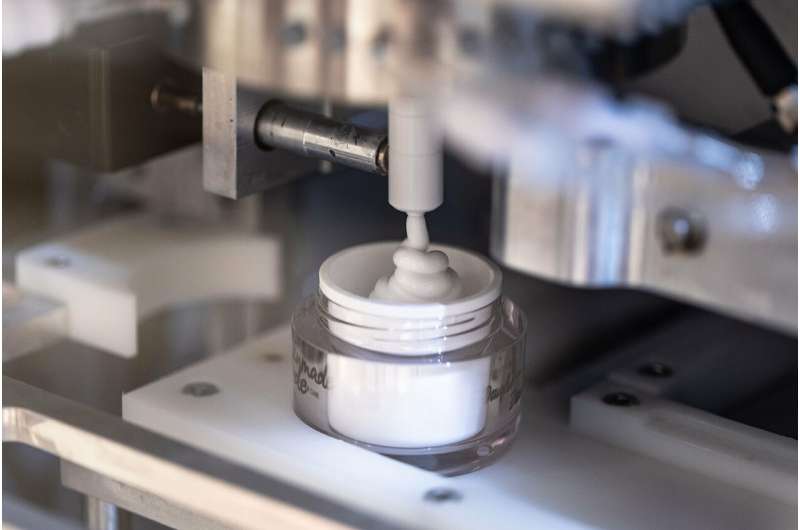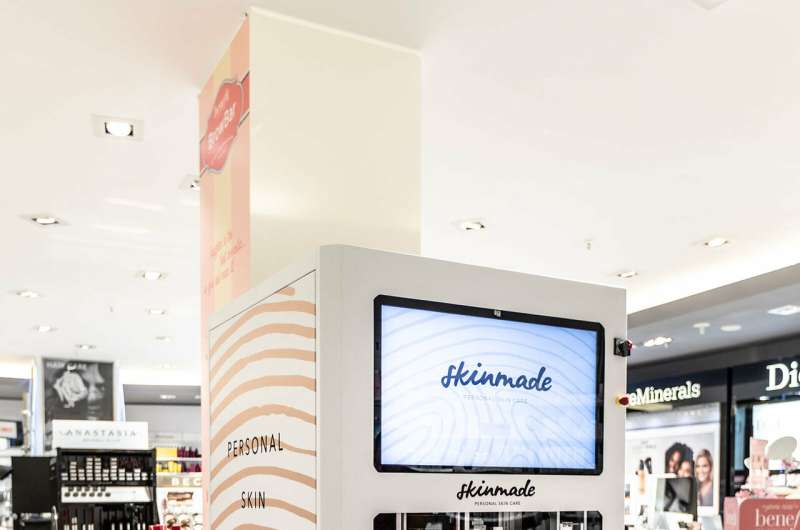Personalized skin cream from a mini beauty plant

Throughout the day, our skin is exposed to a range of hostile elements: wind, rain, sunlight, central heating, vehicle emissions... It is vital therefore to ensure it receives proper care. Most importantly, this means choosing a skincare product that is suitable for your type of skin. Fraunhofer researchers have now come up with a commercially viable method of producing a facial skincare product that is precisely tailored to the actual condition of your skin. What's more, it contains nothing but essential ingredients.
Drugstore shelves are crammed with different face creams. But which one is best for your particular type of skin? Making the right choice can be a tricky business, not least because other factors are involved, such as the season of the year, your current stress levels, hormonal balance and age. All of these can have a significant impact on the current condition of your skin. Lots of women would love to have a face cream that is just right for their needs. Such a personalized skincare product is now available from the company Skinmade. A spin-off from the Fraunhofer Institute for Manufacturing Engineering and Automation IPA, Skinmade has been set up by Viktor Balzer, an industrial engineer at Fraunhofer IPA, and Dr. Lars Rüther, a molecular biologist from Dermatest GmbH. Skinmade's Personal Skin Care is already on sale at three outlets of the cosmetics chain Douglas – in the German cities of Frankfurt, Hamburg and Sindelfingen – and is scheduled for rollout in all major German cities by the end of 2019.
Batch-size-one production at low unit costs
Developed on the basis of five years of research plus the combined know-how of a multidisciplinary team of IT specialists, engineers, dermatologists, pharmacists and biologists, this innovative product has undergone extensive dermatological testing with live subjects and is fully compliant with the EU regulation on cosmetic products. At its heart is an innovative cyber-physical production system that will deliver a jar of personalized skin cream at the press of a button – and for a reasonable price. The cost to the consumer for a 30-milliliter jar of Skinmade Personal Skin Care is 40 euros. The touchscreen-operated unit comes in a compact housing the size of a closet. This comprises the entire production process, starting with technology to measure the skin's natural hydration and lipid levels, and including the production control system as well as all the raw materials plus jars and caps for the cream. At the end of the process, the finished product is proffered on the machine's dispensing tray. "We're basically talking here about 'batch-size-one' production, i.e., about being able to produce customized products on a profitable basis," says Balzer. In effect, he and a research team from Fraunhofer IPA have developed a patented system that enables the production of batch-size-one items at an increasingly low unit cost thanks to the exploitation of economies of scale and other synergies. "A customized product normally entails a high unit cost. But we've been able to get around this and produce our cream for a relatively low retail price. Not that I'm going to tell you how our patented system works! Let me just say that the various dosage, homogenization and purification steps are all integrated in one single process. That's what makes it so fast." The system is capable of dosing very fine concentrations of individual ingredients in quantities as small as three microliters. Also underpinning the success of this concept is the team's specialized knowledge in the field of dermopharmacy – i.e., the effect that certain ingredients have on key biomarkers.

Produce your personalized cream in seven minutes
The first step is to measure the skin's natural hydration and lipid levels with spot checks on the forehead, cheek and below the corner of the mouth. This process measures various biomarkers in order to gage the actual condition of the skin. Using a method known as corneometry, the level of skin hydration is determined. This relies on a measurement of the relative permittivity of the uppermost skin layer, the stratum corneum, which is around 20 micrometers in depth. Another method – sebumetry – serves to quantify the level of surface lipids on the skin. This is based on a technique known as grease-spot photometry. Here, an opaque strip of material is placed on the skin for a period of 30 seconds. Contact with the sebum in the skin renders the strip translucent. Analysis of the degree of translucency then serves to determine the lipid levels in the skin. A further technique is employed to measure the skin's elasticity. The data from these various measurements is then analyzed by means of self-learning algorithms and neural networks programmed by the team. On this basis, the system can then calculate how much of which ingredients should go into the personalized skin cream. Balzer and his team have also put together the training datasets required for machine learning. The entire cyber-physical production system is controlled by means of a cloud solution. Once the data have been analyzed, the results are fed into the machine's control system. A mere seven minutes later, the customer is presented with a 30-millimiter jar of face cream customized to their precise skin requirements. Customers can also specify their preferred fragrance and consistency. Skinmade recommends repeating the analysis after six weeks. That way, it can be determined whether the skin has altered and whether a new formulation might be more appropriate. In other words, customers can be sure of always getting a cream that is right up to date with their current skin condition. "A standard skin cream can never be as effective as a customized one," says Rüther. "It's possible that a product from the shelf contains ingredients at a concentration you don't need. That means you might end up getting too much or too little.
Plans for a mini skin analyzer for home use
In the future, customers will also be able to book skincare consultants – equipped with a mobile skin analyzer – for home visits. Following analysis, skin data will be processed in the cloud. The finished product is then dispatched by mail. Alternatively, customers will be able to order their very own mini skin analyzer online, complete with special app, and then carry out their own skin measurements, before sending the data to Skin-made. This option is scheduled for rollout in 2020. Meanwhile, the team at Skinmade is busy exploring further customized items. The latest project is to put together a bespoke set of personal care products – comprising cleanser, tonic and serum – in which each item is perfectly matched with the others.
Provided by Fraunhofer-Gesellschaft



















